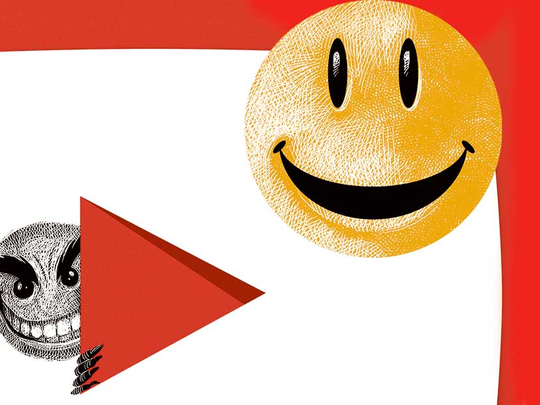
YouTube: Good or evil? It’s a question that its three founders probably didn’t stop to ask 10 years ago. As the video-sharing site celebrates its tenth birthday, instead of the usual slice of cake and party hats, we find ourselves faced with a series of questions about whether its impact has been positive or negative.
When I first came across the site, I spent my time re-living intros from my favourite 1980s TV programmes, with maybe the occasional clip of a dog on a skateboard thrown in for good measure. It was all jolly exciting. It rekindled memories of shows I used to watch as a child and of shows which I had forgotten. I could cut straight to the good bits without the inconvenience of having to watch the entire episode.
Still it remains the last bastion of hope for the terminally idle.
The power of YouTube was quickly realised and before you could say “buffering”, the internet was awash with a new kind of celebrity. Anyone who was anyone could pick up a guitar, demonstrate how to make a baked Alaska, or indeed bite Charlie’s finger. How many careers have been launched or furthered as a result?
Indeed, the likes of Kim Kardashian rose to fame after an explicit video of her and her former partner, Ray-J, was leaked and appeared on YouTube. After that one video she was elevated to being the face of a multimillion dollar empire that you have to ask: Would it exist if it wasn’t for video sharing?
However, copyright infringements are a daily norm. Full episodes of TV shows and entire films exist on the site. And while the site administrators try to enforce a degree of law and order, at the click of a mouse you can be watching Frozen — something you should have paid Dh85 to do at the DVD shop.
Of all the social media sites that exist — the Facebooks, the Twitters, and so on — YouTube has added a new layer of depth as to how we absorb and share information.
While we can ignore one person’s tedious Facebook rant about having to wait in line at the bank, it’s far harder to ignore a video of bloodied children running for their lives in a fiery war zone.
YouTube has allowed us to see the glamour of Sunset Boulevard one minute, and the hateful scenes of devastation in Homs the next. Once, we used to rely on news broadcasters to paint the picture of Beirut burning to the ground for us. Their words shaped our perceptions of what it must be like.
Not any more. Any poor soul in the area who is “fortunate” enough to have a smartphone can take a quick clip of a burning building or blood-soaked child and within minutes it’s up online, ready for the whole world to see, to condemn, and to share — once they have watched the advert for laser eye surgery, of course.
Untold physical damage
Worse still, it has been hijacked by those who use it to carve their own agendas; for propaganda. What was intended to be a harmless video-sharing platform has become a deadly, potent tool of war. Those with bombs and guns have caused untold physical damage. But those with YouTube accounts have arguably done far worse.
Masked unknowns have been able to preach their ideologies and sow seeds of hate. They have sent public messages directly to the world’s leaders, occasionally using murder to underline their intentions. It has been used by terrorist organisations to incite fear by showing graphic executions. It has been used to scare nations into divisive subversion. Think of the incalculable damage that has been done, especially to younger viewers, who have been watching executions and declarations of hate. While there is no denying that YouTube is not alone in its guilt of allowing such material online, it has become a victim of its own popularity.
Indeed, a picture speaks a thousand words, but a video? That can speak a million.
So has YouTube been good or evil, then? On the one hand we are all grateful for all the old Knightrider and Dallas reruns, and of course it has given us Kim Kardashian and many skateboarding dogs. It can make us smile.
On the other hand, though, it has been used to help drive a wedge between people, to provoke unrest and to stoke hate. It can scare us.
In its first 10 years, YouTube has given everyone a platform to show those on the other side of the world what’s going on; it has helped to procrastinate, motivate, liberate and exasperate. Perhaps now it needs to look back on its life, take responsibility for its mistakes, clean up its act — and grow up.








